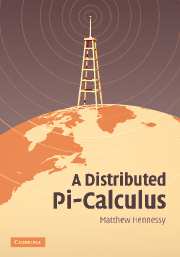3 - Types for aPi
Published online by Cambridge University Press: 05 August 2012
Summary
In this chapter we look at type systems for the language aPi. The traditional view of types is that they provide an aid to programmers to avoid runtime errors during the execution of programs. We start with this view, explaining what runtime errors might occur during the execution of aPi processes, and design a type system that eliminates the possibility of such errors.
We then modify the set of types, so that they implement a more subtle notion of resource access control. Here the resources are simply channels, and the more subtle type system enables access to these resources to be managed; that is read and write accesses can be controlled. The view taken is that one no longer programs directly with resource names. Instead programming is in terms of capabilities on these names, the ability to read to or write from a particular resource. These capabilities are managed by the owners of resources and may be selectively distributed to be used by other processes.
Runtime errors
The traditional use of types and type checking is to eliminate runtime errors in highlevel programs. Specifically types are annotations inserted into the program text by the program designer, or inferred automatically by a type inference system, which indicate the intended use of various resources. Then prior to execution the annotated program is typechecked, that is syntactically analysed, to ensure that the behaviour of the program will indeed respect the intended use of these resources.
- Type
- Chapter
- Information
- A Distributed Pi-Calculus , pp. 55 - 95Publisher: Cambridge University PressPrint publication year: 2007



